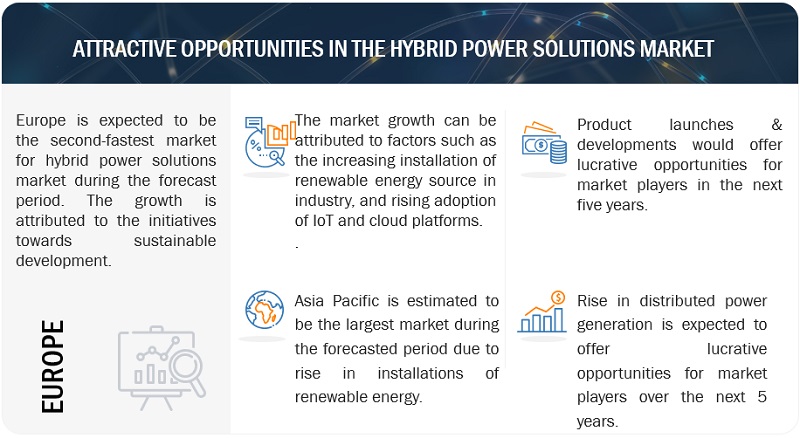The global hybrid power solutions market is projected to reach USD 4.0 billion by 2028 from an estimated USD 2.4 billion in 2023, at a CAGR of 10.4% during the forecast period. Hybrid power solution are primarily used in remote and off-grid areas, telecom infrastructure, commercial buildings, industrial facilities, residential applications, mining and oil & gas, and renewable energy projects. Hybrid power solutions combine renewable energy sources with conventional power generation or energy storage technologies to provide a stable and reliable electricity supply while promoting sustainability and reducing carbon emissions.
Download PDF Brochure: https://www.marketsandmarkets.com/pdfdownloadNew.asp?id=121425179
Some key trends in such as lesser operating costs, and increasing hybrid power generation in off-grid locations drive the market for hybrid power solution with the rising need for power generation. This has enhanced the hybrid power solution market.
This report segments the hybrid power solutions market based on system type five two types: Solar-fossil, wind-fossil, solar-wind-fossil, solar-wind, and others. The solar-fossil segment is expected to be the second-largest segment in hybrid power solutions market in the forecast period. Solar energy’s widespread availability and substantial cost reductions have rendered it economically feasible for integration into hybrid systems. Furthermore, solar power exhibits a higher adoption rate, fueled by supportive governmental policies, incentives, and heightened environmental awareness. Consequently, the solar fossil segment has experienced substantial growth in hybrid power solutions, becoming the favored option for sustainable and cost-effective energy generation.

This report segments the hybrid power solutions market based on grid connectivity into two segments: on-grid, and off-grid. On-Grid is expected to be the fastest growing segment in the market. On-grid hybrid solutions leverage existing power grid infrastructure, facilitating cost-effective integration of renewable sources like solar and wind, particularly advantageous for solar-wind hybrid projects. These solutions ensure a stable power supply and enable residential, commercial, and manufacturing sectors to feed excess power back into the grid, offering reliable electricity and potential revenue generation through feed-in tariffs or net metering.
Ask Sample Pages: https://www.marketsandmarkets.com/requestsampleNew.asp?id=121425179
The world has experienced a significant rise in power generation capacities over the years, driven by increasing energy demand, economic growth, and efforts to reduce carbon emmissions. As a result, the demand for efficient power generation has also been steadily increasing, leading to adoption of hybrid power solution. The industry has witnessed significant technological advancements that have simplified the design, installation, and maintenance processes. With the backing of stakeholders, the implementation of these advanced technologies can proceed smoothly, enabling the expansion of hybrid power generation capacity.


